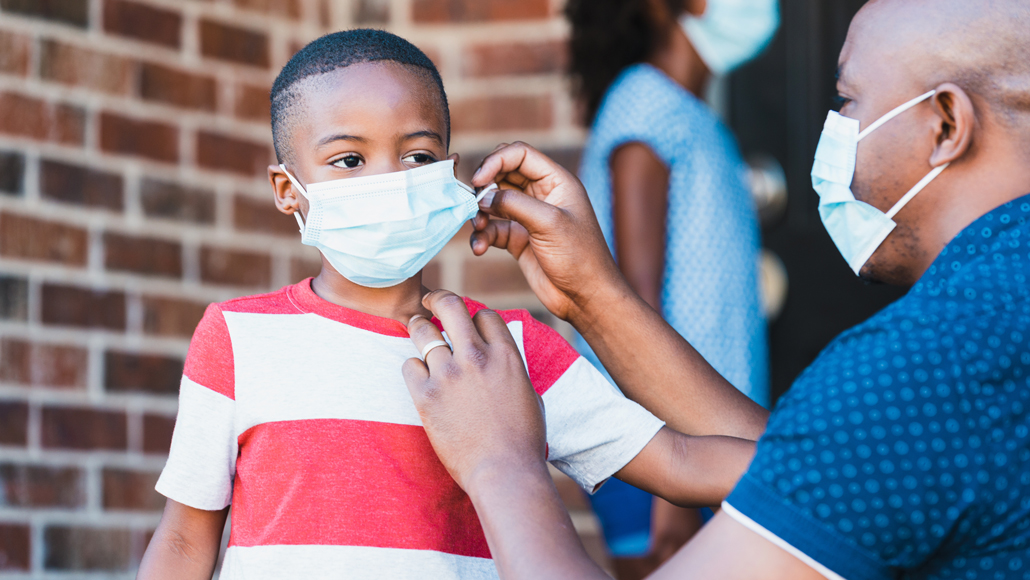Early immune responses may be why younger people get less sick from COVID-19
The immune response of people over age 24 revs up more later in a coronavirus infection

Infections with the coronavirus that causes COVID-19 tend to result in milder disease in younger people, although it is unclear why. A new study hints that it may be due to age-related differences in how the immune system responds.
SDI Productions/E+/Getty Images Plus
One of the lingering questions of the pandemic is why COVID-19 symptoms tend to be milder in children and young adults than in older people. A new study suggests that the immune systems of people younger than 24 deal the coronavirus a strong first punch. Those early immune defenses, which set off alarm bells for the body to go on the attack no matter what the invader, may be weaker in older adults.
Having more muted frontline defenses could allow an infection with SARS-CoV-2, the virus that causes COVID-19, get a foothold, resulting in worse symptoms for older people, researchers report September 21 in Science Translational Medicine.
The results add to evidence that boosting early immune responses to the virus with a vaccine or drugs like interferons — which are based on proteins the body produces to stimulate immune cells — could help protect people (SN: 8/6/20).
Researchers have had some ideas why younger people generally get less sick. It’s possible that compared with adults and older kids, younger children have lower amounts of the ACE2 protein in their upper respiratory tracts. That’s a protein that the virus uses to break into cells (SN: 8/4/20). Another explanation could have been that young people have less virus in their bodies, which could mean milder symptoms, although studies have shown that viral load is similar across people no matter their age. Or differences in the immune system, which tends to become less robust with age, could play a role.
In the new study, pediatric infectious diseases physician and virologist Betsy Herold and colleagues divided 125 COVID-19 patients hospitalized at Montefiore Medical Center in New York City into five categories. People younger than 24 were split into three groups: those with symptoms who did not need a ventilator, those that did need ventilation and a third group that included kids who developed a coronavirus-related inflammatory syndrome that mainly affects children younger than 5 (SN:6/3/20). Adult patients older than 24 fell into two groups: people who needed a ventilator or died and those who recovered.
When the team compared the immune responses among groups, it found that younger people, including those with the inflammatory syndrome, had higher amounts of an immune signaling molecule called IL-17A than older adults. That protein is typically associated with T cells — immune cells that recognize fragments of specific viruses and can kill infected cells or help activate other parts of the immune system. T cells normally are part of a second wave of defense launched by the immune system.
But IL-17A is also produced by immune cells from the body’s first line of defense. Both older and younger people had similar numbers of T cells linked to the signaling molecule. That means the abundance of IL-17A seen in young people likely came from immune cells tied to the body’s early defenses against the virus, the researchers suggest.
Compared with adults who had severe COVID-19, younger patients who did not need a ventilator also had lower levels of other immune signaling proteins involved in inflammation, like one called IL-6 that has been linked to an overactive immune response. That overreaction is responsible for severe symptoms in many of the sickest COVID-19 patients.
Sign up for our newsletter
We summarize the week's scientific breakthroughs every Thursday.
One potential issue with the study is that the results weren’t adjusted for underlying conditions, says Mark Slifka, a viral immunologist at Oregon Health & Science University in Portland. Adults in the study were more likely to have high-risk conditions like diabetes and high blood pressure, which could help explain the differences in disease compared with younger people (SN: 3/20/20).
Older adults did ultimately mount a stronger virus-specific immune response later in infection, compared with younger people. How helpful that response actually is remains unknown. Older adults, especially those on a ventilator or who had died, had a stronger response of T cells that recognized a protein on the virus’ surface, called the spike, compared with younger people. People older than 24 also made more antibodies that prevent the virus from infecting new cells, called neutralizing antibodies.
“It’s not that [adults] can’t make a neutralizing antibody response,” says Herold, of the Albert Einstein College of Medicine and the Children’s Hospital at Montefiore in New York City. “It’s not that they can’t make a good T cell response. Maybe they make too much of [a late immune response] or a dysregulated one.”
The fact that severely ill adults had more T cells than younger people is interesting, Slifka says, in part because the role those immune cells have in COVID-19 is still unclear (SN: 5/15/20). In the study, a high T cell response wasn’t associated with mild disease, hinting that those responses weren’t necessarily protective, Slifka says. But studies need to be done with more patients to know for sure. “We’re still trying to figure out if T cells play a role in protection,” he says.







